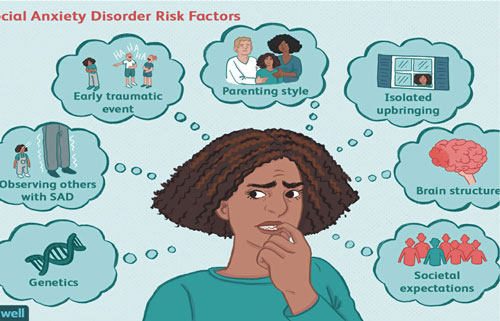ANXIETY is a topic about which people have a lot of information. Anxiety has earned the greatest fame in clinical psychology and studied of mental disorder.
Anxiety refers to an unpleasant sense of fear and restlessness. Generally it is taken to mean worry. Anxiety is a disease as well as a symptom of mental disorders.
Anxiety disorders are divided into following kinds:
Phobia Panic disorder Generalized anxiety disorder Obsessive compulsive disorder Post-traumatic stress disorder Acute stress disorder Phobia: Meaningless and irrational fear of things or incident is known as a phobia.
The person suffering from a phobia dreads ordinary and harmless things; he avoid such situation as apparently pose no threat.
The word phobia is derived from Greek god “phobia”. This god frightened the enemies. Now this word is used for pathological fear. Psychologists mention many types of phobia.
Specific phobia Social phobia Specific phobia: the phobia that Aries from specific thing and is associated with particular situation or stimulus are called specific phobia.
Beside this, a phobia can be of the following types: Claustrophobia Hydrophobia Acrophobia Zoophobia Hematophobia Apart from this, individual may have a phobia of germs, injections, lifts, tunnels, boats, etc.
Social phobia:
A persistent and irrational phobia that relates to other people is called social phobia. General social phobia appears in early childhood.
Along with it the individual shows other symbols that may include depression and addiction to drugs.
Causes:
Modelling can also be a cause of it, e.g. the child having seen it mother fear lizards, cockroaches and mice can also develop a phobia of them.
Treatment:
The learning of social skills also helps the individual to overcome a phobia.
Panic disorder:
The typical symptom of panic disorder is sudden fits of anxiety that seize a person again and again. The individual begins to show strange symptoms unexpectedly. He is gripped with unease, fear, terror, and panic as if a disaster were going to happen.
The individual suffers panic attack again and again. If an attack of this kind happen in a specific situation. It is called cued panic. For example, one may go into panic while travelling or visiting a hospital etc
Generalized anxiety disorder (GAD):
The patients of generalized anxiety disorder constantly remain restless and agitated. Such patients show deep anxiety at trivial issue and stimuli.
If a person shows six of following symptoms persistently, he is diagnosed to have generalized anxiety disorder.
Trembling and shivering Muscle tension and aches Inability to relax Difficulty in sleeping Difficulty concentrating Shortness of breath Rapid heartbeat and pulse beat Sweating especially in hand Dry mouth Dizziness, diarrhea and other stomach disorders
Causes:
The painful events one has foreknowledge of create less anxiety whereas unexpected painful events cause a lot of anxiety.
Treatment:
All the method used in the treatment of phobia and panic disorders are also effective in treating generalized anxiety disorder.
Obsessive compulsive disorder (OCD):
This anxiety disorder consists of two phases. In the first phase, the individual obsessed by various thought and fail to get rid of them despite his utmost efforts. In the second phase the individual feels obliged to do a thing and cannot resist repeating it in the spite of his efforts.
Obsession:
Obsessions refer to the recurrent and persistent thoughts that hinder ones performance; they dominate the mind unimpeded and remain out of the individual control.










